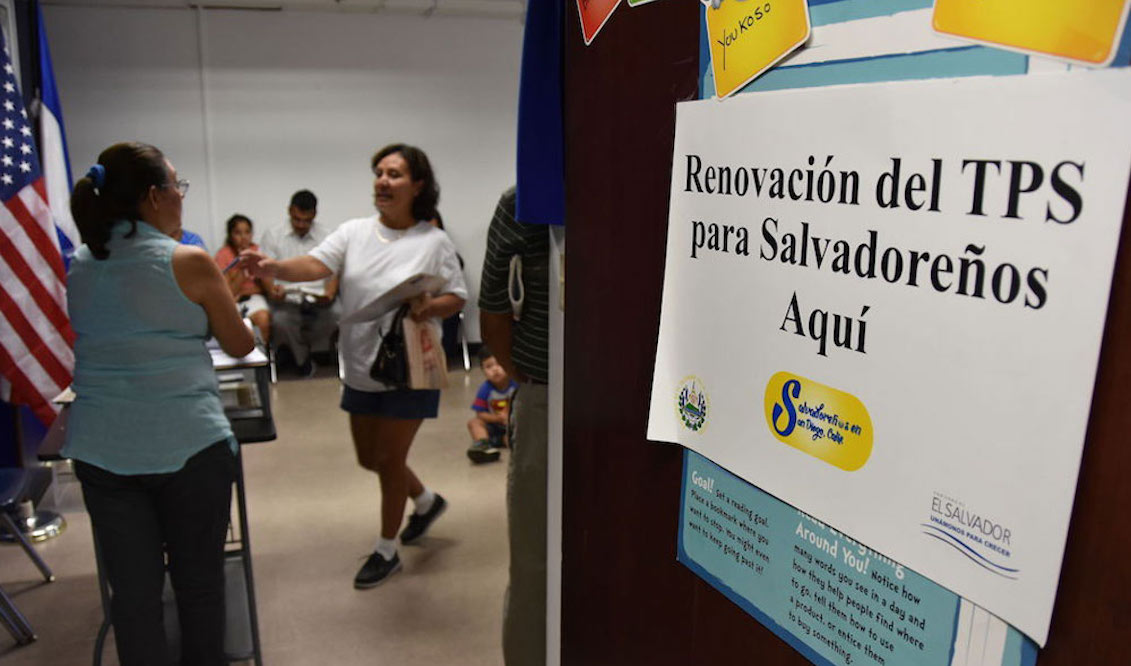
Trump has ended the TPS for Salvadorans
In a document published by the Department of Homeland Security on Monday, more than 200,000 Salvadorans have been left officially unprotected.
In a move contained in the Trump Administration's new anti-immigration package, the Department of Homeland Security has made official the end of Temporary Protected Status (TPS) for Salvadoran citizens residing in the United States.
According to the document, individuals who have requested protection after the earthquake that hit El Salvador two decades ago and have decided to settle in the United States will have until September 9, 2019, to get an alternative way of residency or leave the country.
According to the Politico portal, immigrants from El Salvador are the largest population under protection status, which was renewed consecutively under administrations both Republican and Democrat until now.
Around 263,000 people are now unprotected and under threat of deportation, as the TPS allowed them to reside legally and work in the United States.
For the DHS secretary, Kirstjen Nielsen, "the conditions in El Salvador have improved significantly since (the catastrophe)," which puts an end to the original justification for protecting these immigrants from deportation.
“Only Congress can legislate a permanent solution addressing the lack of an enduring lawful immigration status of those currently protected by TPS who have lived and worked in the United States for many years,” the announcement states. “The 18-month delayed termination will allow Congress time to craft a potential legislative solution.”
According to the Washington Post, this is the most radical measure imposed by the Trump administration considering the number of people affected: those 200,000 Salvadorans are parents of around 190,000 young people born and nationalized as Americans, and a third of them are owners of properties in the country.
During the month of November, the government also ended the TPS that protected 60,000 Haitians and 2,500 Nicaraguans after the natural disasters of 2010 and 1998, respectively.
This decision will not only affect Salvadorans residing in the United States but also their country of origin, which is listed as one of the most violent nations in all of Latin America. According to Kevin Appleby of the Center for Migration Studies in New York, ending the TPS will involve the "destabilization of an already violent country," which translates into "weakening our interest in a more stable Central America."
RELATED CONTENT
But for columnists and analysts like Cristian Izquierdo (NACLA), the TPS has become a political tool for both the US government and the Salvadoran governments.
According to Izquierdo, the hundreds of thousands of Salvadorans who arrived in the United States in the 1990s fled the "great impact of an armed conflict that lasted 12 years (1980-1992), in which US-backed forces killed up to 75,000 civilians." It was the natural disasters between 1998 and 2001 that eventually led to the formation of the TPS as a preventive measure, which implied an income of up to 120 million dollars per year from the application of permit fees.
Likewise, family remittances sent from the United States to the countries of Central America have added up to 8.5 billion dollars, only in 2016, which is interpreted as the real meaning of the "symbol of friendship and support" that the Bush and Obama administrations referred to.
The Salvadoran right wing used this reality to obtain votes during the elections, threatening that the left would make the TPS disappear if coming to power.
For Trump, on the other hand, the annulment of TPS wins him solidarity within his closest circles - a cabinet of people who have shown their antagonism to immigration - and within those who should vote in favor of their Republican representatives during this year's elections.
Finally, those who really lose are not only the hundreds of Salvadorans who will be left unprotected but the companies that depend on immigrant labor, because of all those who have protection, 80% are working, explained the executive director of Haitian Women of Miami, Marleine Bastien to the Miami Herald: "They are our teachers, professors, and business owners".
The decision is now in the hands of Congress, who will have to find a solution in the midst of the chaotic political scenario expected in 2018.











LEAVE A COMMENT: